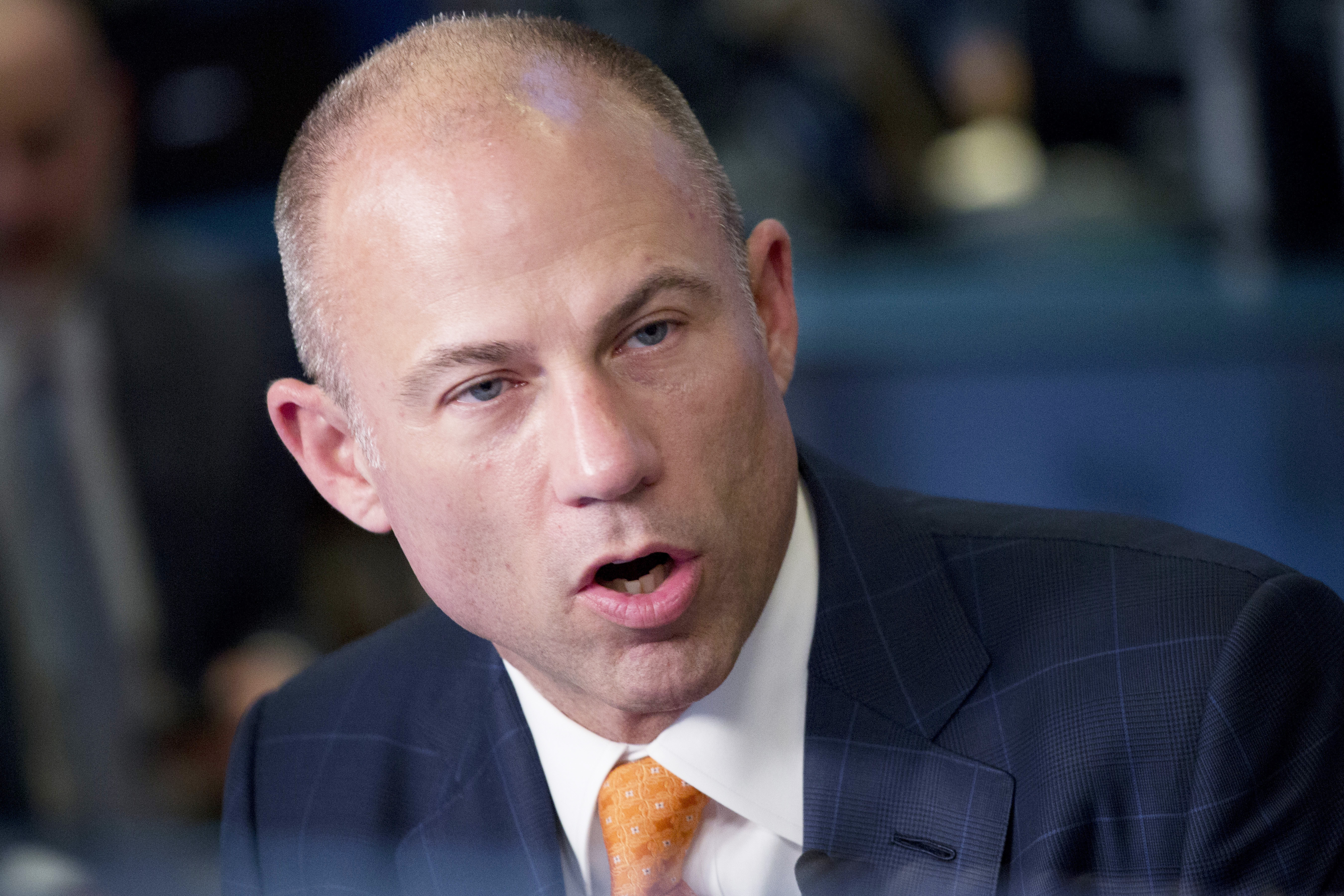Avenatti Renews Bid to Send Stormy Daniels Theft Case to California, Citing Pandemic-Related Concerns
The embattled celebrity attorney, who was convicted in February of trying to extort Nike Inc., on Thursday renewed his bid to transfer the case charging him with stealing money from his former client, adult-film star Stormy Daniels, from New York to Los Angeles.
June 12, 2020 at 01:11 PM
4 minute read
 Michael Avenatti is interviewed on the Cheddar network, Thursday, May 10, 2018, in New York. AP Photo: Mark Lennihan
Michael Avenatti is interviewed on the Cheddar network, Thursday, May 10, 2018, in New York. AP Photo: Mark Lennihan
Michael Avenatti has again asked a Manhattan federal judge to transfer his pending criminal case to California, where he is also under federal indictment, arguing that complications from the COVID-19 pandemic made it impractical to proceed with separate trials on two coasts.
The embattled celebrity attorney, who was convicted in February of trying to extort Nike Inc., on Thursday renewed his bid to transfer the case charging him with stealing money from his former client, adult-film star Stormy Daniels, from New York to Los Angeles.
 He is also accused in the Central District of California of stealing millions of dollars from former clients and then submitting false tax returns.
He is also accused in the Central District of California of stealing millions of dollars from former clients and then submitting false tax returns.
Avenatti, who rose to prominence representing Daniels in her lawsuits against President Donald Trump, argued in a six-page transfer motion that both cases should be tried together, due to the strains on judicial resources resulting from the pandemic.
"In light of the COVID-19 pandemic, there is no compelling reason to proceed with two separate trials on two different coasts. The conservation of judicial and juror resources, as well as the protection of the public from exposure to SARS-CoV-2, are paramount," wrote attorney Thomas Warren, of Warren Terzian in Los Angeles.
The late U.S. District Judge Deborah A. Batts of the Southern District of New York denied a similar request by Avenatti and his lawyer, H. Dean Steward, last September, finding that a move to consolidate the two cases likely would create more problems than it would solve. Consolidation, she said, would not be automatic, and a transfer would require the New York prosecution team to relocate for a time to the West Coast.
Since then, however, the COVID-19 crisis has forced the Southern District to shutter nearly all in-person operations, and jury trials in the district have been postponed indefinitely. The judge overseeing the sprawling criminal case in California in April also ordered Avenatti temporarily released from Manhattan's Metropolitan Correctional Center, where he had been awaiting sentencing in the Nike case, due to health concerns stemming from the pandemic.
In Thursday's motion, Warren said that growing court backlogs and concerns about public safety had only bolstered his client's arguments in support of his transfer motion.
"There is no reason to assemble two jury venires and unnecessarily expose two sets of judicial participants—judges, law clerks, jurors, attorneys, witnesses, court reporters, court clerks, members of the public, and the media—to possible infection with SARS-CoV-2, which has already infected more than 2 million Americans and killed more than 110,000 at the time of this writing," he said.
The motion is now before U.S. District Judge Jesse M. Furman of the Southern District of New York, who has taken over the case following Batts' sudden death in February.
The move also comes after federal prosecutors in California this week accused Avenatti of violating the terms of his release by using a computer to draft his own legal filings while under home confinement at a friend's house in California.
Steward responded that his client has complied with all of the terms of his release and said that Avenatti had not used the internet since his release from jail.
The Manhattan U.S. Attorney's Office has accused Avenatti of stealing money from book payments belonging to his former client Daniels, whose real name is Stephanie Clifford. He has maintained his innocence and repeatedly denied any wrongdoing.
Trial in the case is tentatively set for October; however, court shutdowns resulting from the pandemic make it unlikely that trials in the Southern District will resume until next year, sources have told the Law Journal.
In California, Avenatti is charged tax fraud, bankruptcy fraud and other offenses in a 36-count indictment alleging that he had stolen from former clients. In particular, he faces 10 counts of wire fraud for pocketing millions of dollars from more than $12 million he received during the past five years as part of four settlements, including one on behalf of a paraplegic client.
Avenatti has pleaded not guilty to the charges.
READ MORE:
NY Federal Judge Blocks Michael Avenatti's Bid to Move Theft Case to California
Avenatti Ordered Released From Manhattan Federal Lockup Over Coronavirus Concerns
Michael Avenatti Convicted of Federal Fraud, Extortion Charges in Nike Shakedown
This content has been archived. It is available through our partners, LexisNexis® and Bloomberg Law.
To view this content, please continue to their sites.
Not a Lexis Subscriber?
Subscribe Now
Not a Bloomberg Law Subscriber?
Subscribe Now
NOT FOR REPRINT
© 2025 ALM Global, LLC, All Rights Reserved. Request academic re-use from www.copyright.com. All other uses, submit a request to [email protected]. For more information visit Asset & Logo Licensing.
You Might Like
View All
Private Equity Giant KKR Refiles SDNY Countersuit in DOJ Premerger Filing Row
3 minute read
Skadden and Steptoe, Defending Amex GBT, Blasts Biden DOJ's Antitrust Lawsuit Over Merger Proposal
4 minute read
Trending Stories
Who Got The Work
J. Brugh Lower of Gibbons has entered an appearance for industrial equipment supplier Devco Corporation in a pending trademark infringement lawsuit. The suit, accusing the defendant of selling knock-off Graco products, was filed Dec. 18 in New Jersey District Court by Rivkin Radler on behalf of Graco Inc. and Graco Minnesota. The case, assigned to U.S. District Judge Zahid N. Quraishi, is 3:24-cv-11294, Graco Inc. et al v. Devco Corporation.
Who Got The Work
Rebecca Maller-Stein and Kent A. Yalowitz of Arnold & Porter Kaye Scholer have entered their appearances for Hanaco Venture Capital and its executives, Lior Prosor and David Frankel, in a pending securities lawsuit. The action, filed on Dec. 24 in New York Southern District Court by Zell, Aron & Co. on behalf of Goldeneye Advisors, accuses the defendants of negligently and fraudulently managing the plaintiff's $1 million investment. The case, assigned to U.S. District Judge Vernon S. Broderick, is 1:24-cv-09918, Goldeneye Advisors, LLC v. Hanaco Venture Capital, Ltd. et al.
Who Got The Work
Attorneys from A&O Shearman has stepped in as defense counsel for Toronto-Dominion Bank and other defendants in a pending securities class action. The suit, filed Dec. 11 in New York Southern District Court by Bleichmar Fonti & Auld, accuses the defendants of concealing the bank's 'pervasive' deficiencies in regards to its compliance with the Bank Secrecy Act and the quality of its anti-money laundering controls. The case, assigned to U.S. District Judge Arun Subramanian, is 1:24-cv-09445, Gonzalez v. The Toronto-Dominion Bank et al.
Who Got The Work
Crown Castle International, a Pennsylvania company providing shared communications infrastructure, has turned to Luke D. Wolf of Gordon Rees Scully Mansukhani to fend off a pending breach-of-contract lawsuit. The court action, filed Nov. 25 in Michigan Eastern District Court by Hooper Hathaway PC on behalf of The Town Residences LLC, accuses Crown Castle of failing to transfer approximately $30,000 in utility payments from T-Mobile in breach of a roof-top lease and assignment agreement. The case, assigned to U.S. District Judge Susan K. Declercq, is 2:24-cv-13131, The Town Residences LLC v. T-Mobile US, Inc. et al.
Who Got The Work
Wilfred P. Coronato and Daniel M. Schwartz of McCarter & English have stepped in as defense counsel to Electrolux Home Products Inc. in a pending product liability lawsuit. The court action, filed Nov. 26 in New York Eastern District Court by Poulos Lopiccolo PC and Nagel Rice LLP on behalf of David Stern, alleges that the defendant's refrigerators’ drawers and shelving repeatedly break and fall apart within months after purchase. The case, assigned to U.S. District Judge Joan M. Azrack, is 2:24-cv-08204, Stern v. Electrolux Home Products, Inc.
Featured Firms
Law Offices of Gary Martin Hays & Associates, P.C.
(470) 294-1674
Law Offices of Mark E. Salomone
(857) 444-6468
Smith & Hassler
(713) 739-1250







